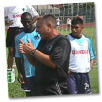Tiger Woods - "The Art of Winning"
 The following are excerpts from an article entitled It Was Over Long Before It Was Over By DAVE ANDERSON in
The following are excerpts from an article entitled It Was Over Long Before It Was Over By DAVE ANDERSON in Of all the elements in Woods’s wizardry, the most impressive has been his gift for what he called the “art of winning”: to stay steady in the pressure cooker of the back nine, or to thwart a challenge. Nobody does it better. And he knows it.
“I know what to do when I’m in that situation, I know what it takes,” he predicted Saturday evening after his 69 in the third round. “There’s a certain feel that you get out there that you can understand what the guys could do and are capable of doing on the back nine, the round, how the wind’s blowing. You just get a certain feel for what the number’s going to be that day. And a lot of times I’ve called the number and I’ve been pretty good on it.”
But like all golfers, Woods had to lose to learn that art of winning. Of his 264 events as a pro, he has won 79 (59 on the PGA Tour), but there were 185 that he didn’t win. And for all his amateur and junior success, including a six-year streak of three United States Amateurs and three United States Juniors, there were many more tournaments that he did not win.
“I think it’s a process of learning,” he said. “A lot of junior and amateur events I played in, I didn’t win that many. But you live and learn. You apply that knowledge. And over the years when I’ve put myself in position to win, I think I’ve done a better job of that as I’ve matured.”


4 Comments:
Coach, Waitzkin calls this investment in loss.
I have asked this question to my former college coach where I had similar experiences as you Vern. Ten years later I wrote and asked him a simple question, "failure and disappointment, can it be avoided"? I know of course we are bound to repeat the elusive game errors, but he did not have an answer.
I see self image and "a desperate need to win, to have everything under control" lock up a lot of young athletes. This is one positive reason to help the middle and late adolescence's identify with the 24hr athlete, it's not a part time job and where ever you go in life it can be applied towards the pursuit of excellence.
Tiger also prevents the downward spiral better than anyone. I liked his quote from the other day in reference to his late bogey and the lead got cut to 1 "I got myself in this mess and now I need to get myself out of it."
Mark Day
He seems to understant a process or performance focus better than most. I find that athletes who recognize they are not there finish times or places, but are in fact much more than that as a human being tend to manage competitive situations far better than those that feel there self worth is where they finish on the leader board.
That is not saying they dont care about winning, but that they are more focused on performing the best they can and know deep down that if they do that, if they strive to perform the skills they have as well as they can the results will come.
Neat comments to post Vern.
I agree that Tiger seems to have a tremendous mindset for winning under pressure, especially when he is in the lead.
He has 0 wins in a major when he going into the 4th round WITHOUT the lead.
That is interesting...
Also, I think the golf stroke is a terrific "skill", but I have a hard time calling it "athletic".
The sequential timing of biomechanics to create power or touch through the club is highly developed, but there is no "reactive" component to it. Look how guys react when someone yells out or a shutter flashes or the wind blows. They pull off the ball and wait until they can work through an uninterfered swing.
Just my 2 cents.
Jeff
Buffalo
Post a Comment
<< Home